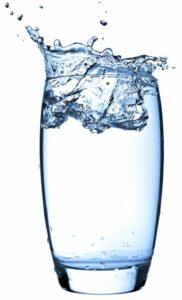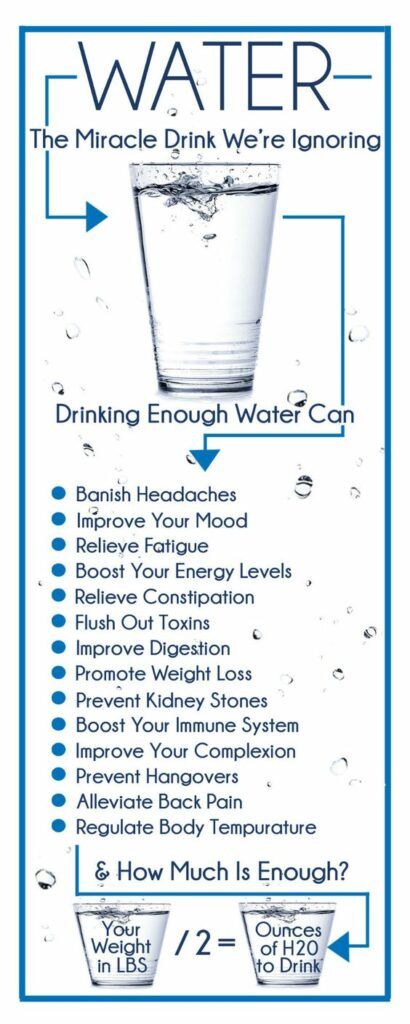Water—the universal, life sustaining substance that is often taken for

granted; especially in the developed nations. Besides quenching our thirsts, what else is water good for. What is the importance of water to the body? It is the intention of this article to answer that question.
What is water
Water is an inorganic chemical substance. It is, odorless, transparent, tasteless, and colorless. It is the main component of the earth’s hydrosphere, which is the portion of Earth’s surface that includes the seas and the water in the atmosphere and the fluids of most living organisms. It is crucial for all forms of life, although it provides no calories or organic nutrients.
Why is water important
Just think of all the many ways we use water: drinking, cooking, bathing, brushing teeth, washing clothes, dishes, and cars, flushing toilets, watering gardens and lawns, and filling swimming pools and that’s just at home. There are many industrial uses as well such as conducting electricity. It is also the best all-around dissolvent. More dense materials dissolve in water than in any other liquid. Mankind has done a pretty good job of making use of water!
Water’s importance to the body
More specifically, what is the importance of water to the body?
For starters, our body is approximately sixty percent of our body weight. That means that over half of our body is water. The body uses water in all of

its cells, organs, and tissues to help regulate temperature and maintain other bodily tasks. Because the body loses water through breathing, sweating, and digestion, it’s important to rehydrate by drinking fluids and eating foods that contain water. The amount of water essential for optimum health depends on a range of things, including the climate, physically activity, illnesses or other health problems.
Water doesn’t merely quench thirst and regulate body’s temperature; it also keeps tissues within the body moist. These include the eyes, nose, and mouth. Keeping the body hydrated helps it retain optimum levels of moisture in these sensitive areas, also as within the blood, bones, as well as the brain. Additionally, water helps protect the spinal cord, and it acts as a lubricant and cushion for the joints.
Water also aids in removing waste. Ample water intake enables the body to excrete waste through perspiration, urination, and defecation. The kidneys and liver use it to help flush out waste, as does the intestines. Water can also prevent one from getting constipated by softening the stools and helping move the food ingested through the intestinal tract.
Water assists with digestion. Digestion starts with saliva, the origin of which is water. Digestion relies on enzymes that are found in saliva to assist the break down food and liquid and to dissolve minerals and other nutrients. Proper digestion makes minerals and nutrients more obtainable to the body. Water is additionally necessary to assist in digesting soluble fiber. With the help of water, this fiber breaks up easily and benefits bowel health by making well-formed, soft stools that are easy to pass.
Water prevents dehydration. The body loses fluids when employed in vigorous exercise: sweat in high heat, or develop a fever or contract an illness that causes vomiting or diarrhea. If fluids are being lost for any of these reasons, it’s important to increase the fluid intake to enable the body to restore natural hydration levels. A doctor may recommend more fluids to help treat other health conditions, such as bladder infections and urinary tract stones. If one is pregnant or nursing, it is best to consult with a physician about fluid intake because the body will be using more fluids than usual, especially if in the case of breastfeeding.
How much water should we drink a day
One suggestion is the 8×8 rule (8 8oz glasses a day). But there’s really no concrete rule on the amount of water to drink each day. Many folks simply drink water when they are thirsty. Basically, people who are in good physical health get enough fluids by drinking water and other fluids when they are thirsty and with each of their meals. One indication of hydration level is by observing urine. If it’s clear that’s a great indication of being well hydrated. However, if it’s dark, that’s a clear indication of dehydration. The clearer the better, the darker, not so much but light yellow is acceptable. Having said that, discolorations can occur from taking certain vitamins or supplements that may make urine darker. Also, other beverages (coffee, tea, sodas) can make urine darker. The only beverage that hydrates completely and makes urine lighter is water.
Everybody’s body is different therefore the required amount of fluid intake varies. It depends on weight, age, the amount of fluid loss during the day, and the level of physical activity.
Personally, if I drank 8 8oz’s glasses a day, I would simply float away!
Through normal daily activities, our bodies can lose up to three to four liters a day just by perspiration, urine, bowel movement, and exhalation of hair. We lose one to two liters alone from just breathing.
How much water should you drink to lose weight
Drinking ample amounts of water will aid in weight loss as follows:
- Drinking water increases caloric burning. Drinking extra 1500 ml water can burn around 23 calories on average per day.
- Drinking cold water before meals can reduce your appetite – you will consume 75-90 calories less per meal. This is because the body uses extra
 energy which burns more calories to heat the water to body temperature before it can be absorbed.
energy which burns more calories to heat the water to body temperature before it can be absorbed. - If we consume more pure, filtered water, we are less likely to drink high-calorie beverages like sodas and sports drinks. These are full of added sugars, and empty calories.
- Water frees fat stored as an energy source.
- It aids to clear toxins. When overloaded with toxins the body turns to alternative plans, like adding fat cells to help store the toxic material. Water facilitates to flush out both the toxins and fat.
- Excess toxins can interrupt hormonal signals that indicate when we are full, and to stop eating. Drinking enough water helps prevent this from happening.
- The organs of elimination and digestion can work properly, ensuring we stay a healthy weight when we drink plenty of water.
- Water eliminates sodium, and our muscle cells stay hydrated, giving us the energy to stay active.
- Water is also important for muscle tone. It energizes muscles by acting as a lubricant around muscles and joints which helps prevent against cramping. Thus allowing for harder and longer to workouts. A well toned body has a faster metabolism that burns fat.
It is recommended to drink 1500mi (50 ounces) of water in addition to your normal water intake. The colder the water, the more effective it is for burning calories.
Therefore, first make sure your water intake is at the proper level. Then add the 1500mi for the weight loss.
Feel free to leave your questions, comment or concern below.
Good Health!!
I had no idea water had so many effects on the human body. I always figured, if i’m still alive and well, I must be getting enough water though it’s through my sweet drinks.
How do you feel about electrolyte infused water like Smart Water for example? The water where I live is high in Calcium, should I drink less of that and more filtered water bought from a store?
I really need to develop the habit so I can lose these few extra pounds. Does cutting other drinks and focusing in on water have a large effect on toning or is it just purely weight up and down?
Hi Chris – High calcium or hard water isn’t considered a health issue so I wouldn’t be concerned unless you have a high level of calcium in your blood which can be determined in routine blood work. As for the elecrtrolyte water, it has things like potassium and sodium added to them, which help your body absorb the water more quickly. This is helpful in preventing dehydration, so they’re especially useful during and after intense workouts. As for toning, water energizes muscles. It acts a lubricant around your muscles and joints that helps prevent against cramping. This allows you to work out harder and longer. Try to limit your intake of sweet drinks and increase your water intake. Sweet drinks contain a lot of added sugar which can lead to health issues. I have another article: “The Facts about High Fructose Corn Syrup” you can check out.
Thanks for your comments and questions!
Water!! This is a very good topic on water, I work Construction so I know first hand how important water intake is.
When you sweat out the water, you really do need to put it back into your body like the comment made about hydrate
do it because if you don’t it can cause many problems with your body. When you work out in the sun all day without drinking water because you think it does not taste good, you better drink it anyway. So this website is a very good reminder for everyone. So Drink water and live better.
Kenny!!!
You’re correct Kenny. re-hydration is very important, especially in your trade. Thanks for commenting!